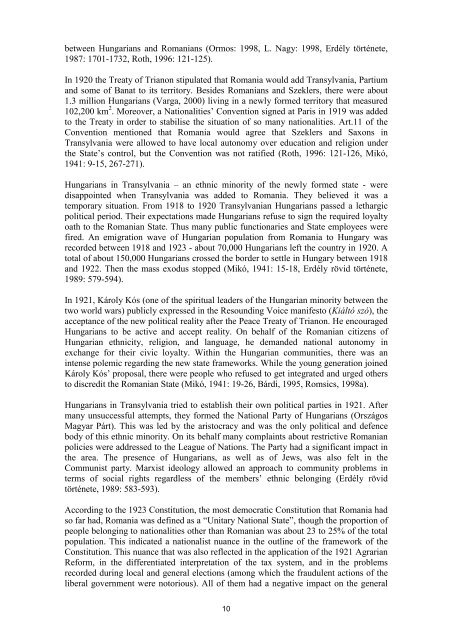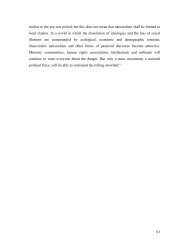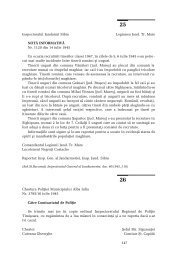Southeast Europe
Southeast Europe
Southeast Europe
You also want an ePaper? Increase the reach of your titles
YUMPU automatically turns print PDFs into web optimized ePapers that Google loves.
etween Hungarians and Romanians (Ormos: 1998, L. Nagy: 1998, Erdély története,<br />
1987: 1701-1732, Roth, 1996: 121-125).<br />
In 1920 the Treaty of Trianon stipulated that Romania would add Transylvania, Partium<br />
and some of Banat to its territory. Besides Romanians and Szeklers, there were about<br />
1.3 million Hungarians (Varga, 2000) living in a newly formed territory that measured<br />
102,200 km 2 . Moreover, a Nationalities’ Convention signed at Paris in 1919 was added<br />
to the Treaty in order to stabilise the situation of so many nationalities. Art.11 of the<br />
Convention mentioned that Romania would agree that Szeklers and Saxons in<br />
Transylvania were allowed to have local autonomy over education and religion under<br />
the State’s control, but the Convention was not ratified (Roth, 1996: 121-126, Mikó,<br />
1941: 9-15, 267-271).<br />
Hungarians in Transylvania – an ethnic minority of the newly formed state - were<br />
disappointed when Transylvania was added to Romania. They believed it was a<br />
temporary situation. From 1918 to 1920 Transylvanian Hungarians passed a lethargic<br />
political period. Their expectations made Hungarians refuse to sign the required loyalty<br />
oath to the Romanian State. Thus many public functionaries and State employees were<br />
fired. An emigration wave of Hungarian population from Romania to Hungary was<br />
recorded between 1918 and 1923 - about 70,000 Hungarians left the country in 1920. A<br />
total of about 150,000 Hungarians crossed the border to settle in Hungary between 1918<br />
and 1922. Then the mass exodus stopped (Mikó, 1941: 15-18, Erdély rövid története,<br />
1989: 579-594).<br />
In 1921, Károly Kós (one of the spiritual leaders of the Hungarian minority between the<br />
two world wars) publicly expressed in the Resounding Voice manifesto (Kiáltó szó), the<br />
acceptance of the new political reality after the Peace Treaty of Trianon. He encouraged<br />
Hungarians to be active and accept reality. On behalf of the Romanian citizens of<br />
Hungarian ethnicity, religion, and language, he demanded national autonomy in<br />
exchange for their civic loyalty. Within the Hungarian communities, there was an<br />
intense polemic regarding the new state frameworks. While the young generation joined<br />
Károly Kós’ proposal, there were people who refused to get integrated and urged others<br />
to discredit the Romanian State (Mikó, 1941: 19-26, Bárdi, 1995, Romsics, 1998a).<br />
Hungarians in Transylvania tried to establish their own political parties in 1921. After<br />
many unsuccessful attempts, they formed the National Party of Hungarians (Országos<br />
Magyar Párt). This was led by the aristocracy and was the only political and defence<br />
body of this ethnic minority. On its behalf many complaints about restrictive Romanian<br />
policies were addressed to the League of Nations. The Party had a significant impact in<br />
the area. The presence of Hungarians, as well as of Jews, was also felt in the<br />
Communist party. Marxist ideology allowed an approach to community problems in<br />
terms of social rights regardless of the members’ ethnic belonging (Erdély rövid<br />
története, 1989: 583-593).<br />
According to the 1923 Constitution, the most democratic Constitution that Romania had<br />
so far had, Romania was defined as a “Unitary National State”, though the proportion of<br />
people belonging to nationalities other than Romanian was about 23 to 25% of the total<br />
population. This indicated a nationalist nuance in the outline of the framework of the<br />
Constitution. This nuance that was also reflected in the application of the 1921 Agrarian<br />
Reform, in the differentiated interpretation of the tax system, and in the problems<br />
recorded during local and general elections (among which the fraudulent actions of the<br />
liberal government were notorious). All of them had a negative impact on the general<br />
10









